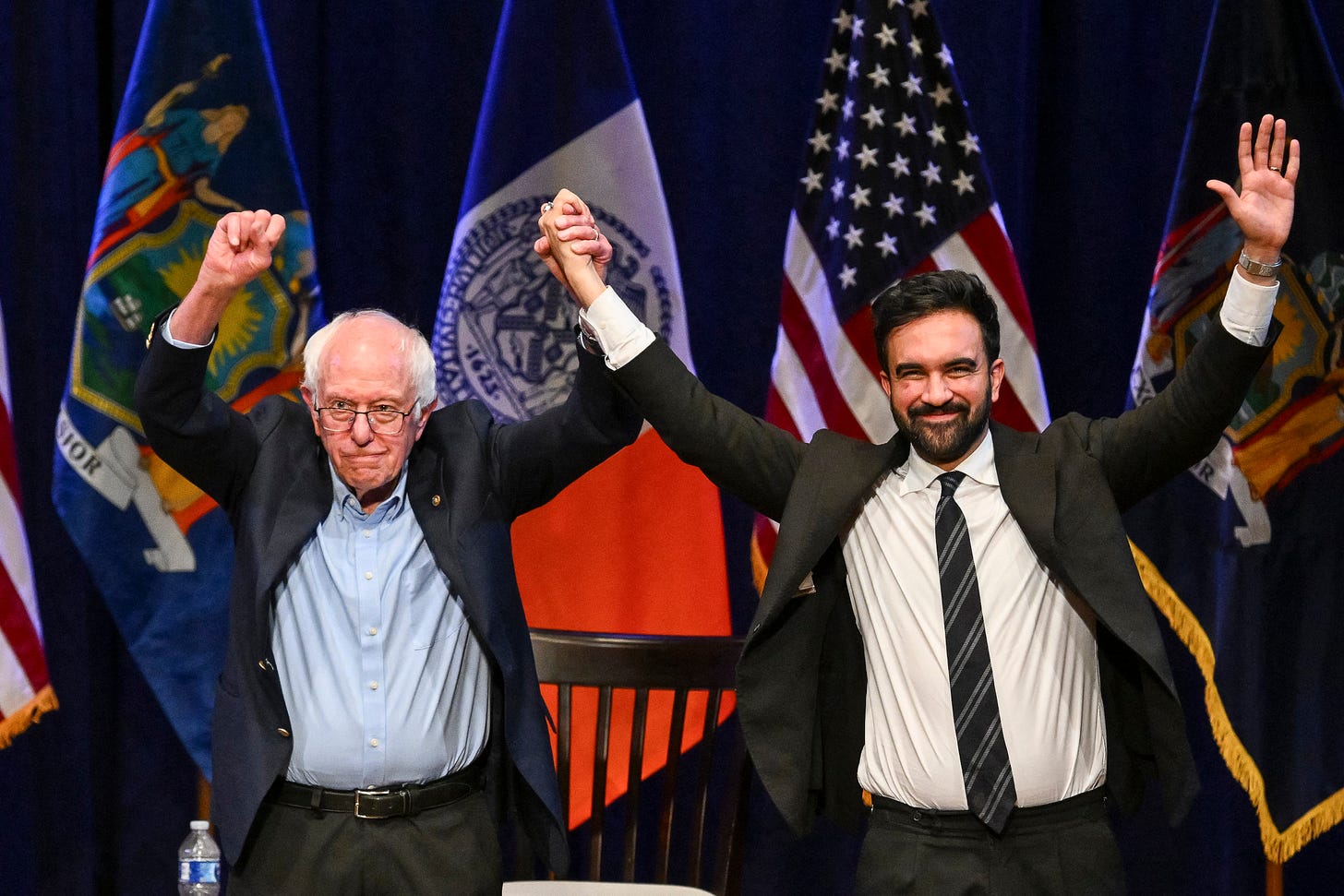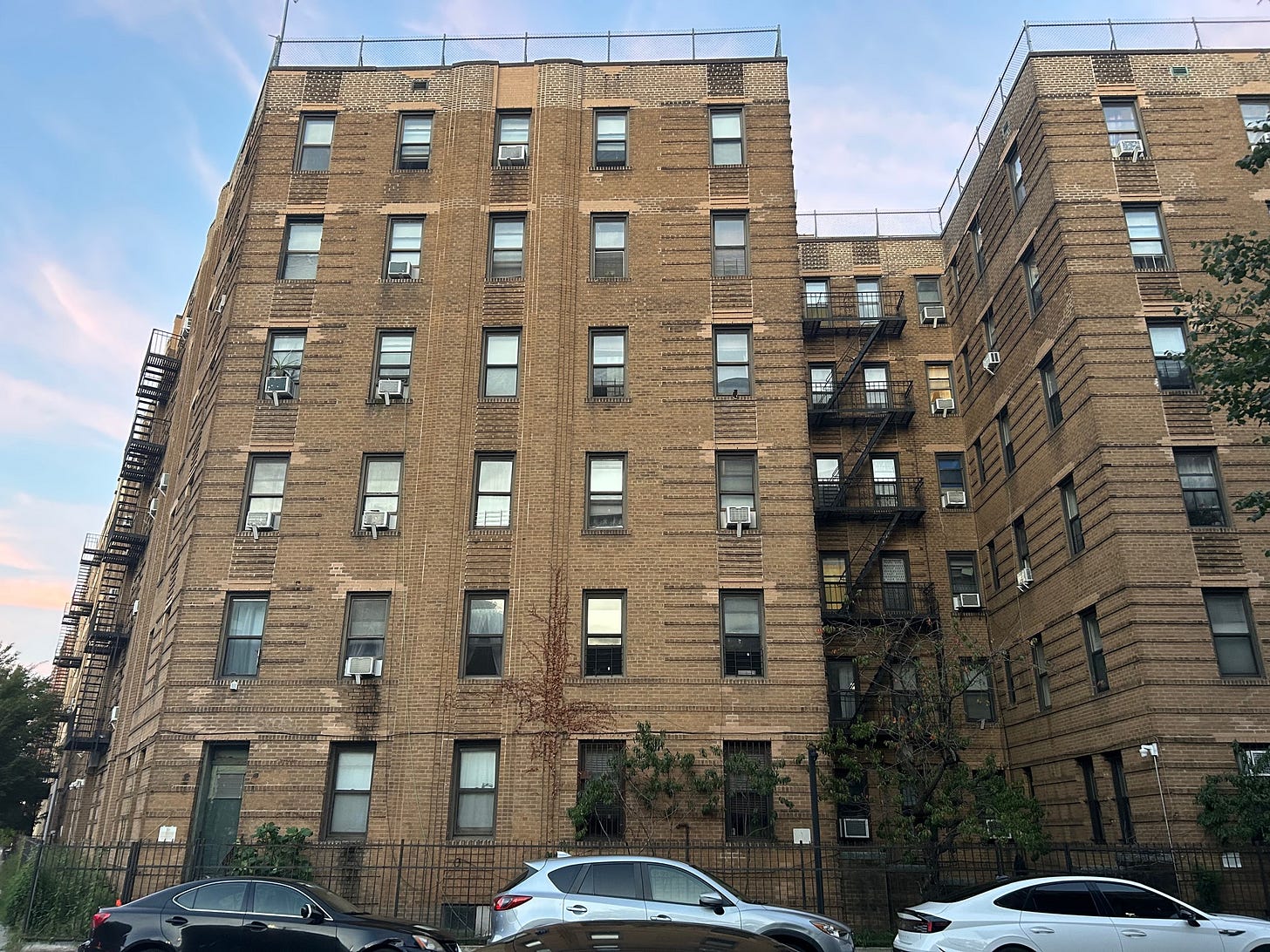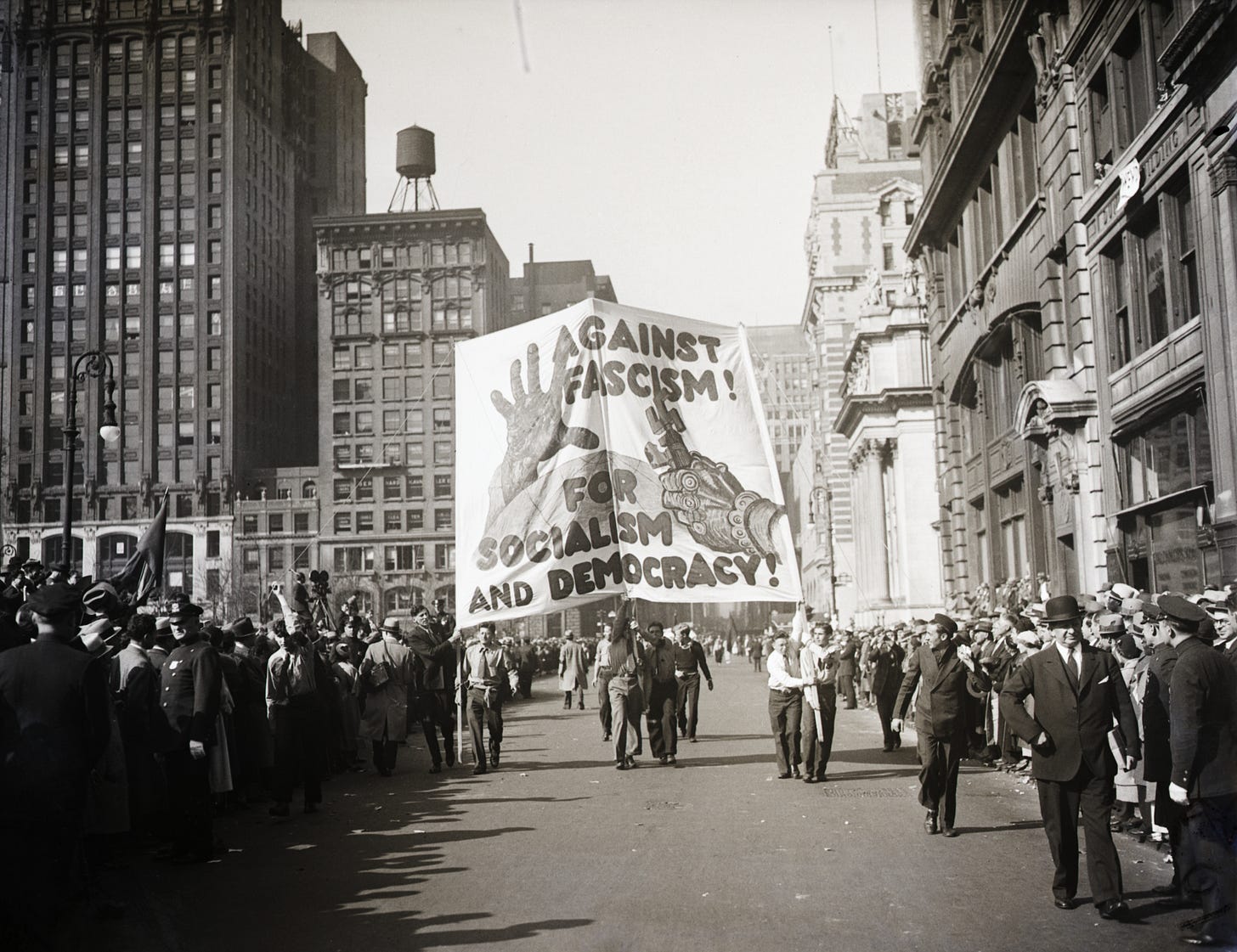New York Socialist City
Where taking care of everyone is common sense.
Bernie Sanders’ childhood home is a six-story tan brick apartment building on the corner of East 26th Street and Kings Highway, deep down in Midwood, far south in Brooklyn’s belly. The building has a few bare cement courtyards and fire escapes and dirty windows with AC units poking out intermittently and a lobby floor that is a little grimy from many decades of scuffing feet. It is thoroughly unremarkable, a building just like mine, a building like thousands of others that stand on thousands of Brooklyn blocks everywhere south of Prospect Park, all the way down to the shores of Coney Island.
Stroll down Kings Highway from the Q train stop and you will see Russians and Asian people and Jewish men in yarmulkes and Muslim women in hijabs, all shopping at fruit stands where Mexican men stack avocados and Chinese women ring up purchases. The people who pass in and out of the average fruit stand anywhere around Kings Highway represent a broader cross section of the world than you could find scouring the entire phone books of many large American cities. Look up the streets all the way to Church Avenue and down the streets all the way to Brighton Beach and everyone you will see is an immigrant, or the child or grandchild of immigrants. (Or a reporter from Florida). That is Brooklyn. That is New York City. We’re all here.
One of my most correct opinions about American politics is: Nobody knows what socialism means. Perhaps a better way to say this is that everyone who says “socialism” means something different. The worst person to ask about what socialism is is a Republican, who doesn’t know what socialism means, and will tell you that everything is socialism. The second worst person to ask is a leftist college professor, who knows exactly what socialism means, and will tell you that nothing qualifies as real socialism. Somewhere between these poles lies the elusive Practical Definition of Socialism, which nobody ever stops long enough to lay out before launching into their various tirades.
The most common usage of the word “socialism” in mainstream political discourse is as a slur, something that Republicans hurl at Democrats, who respond by trying to run in the opposite direction. For those who actually want to have a good faith discussion about socialism, it is imperative to agree on what the term means before you start, or else you and your counterpart are guaranteed to be talking past one another within minutes. As in all discussions of popular politics, the useful definition lies at some reasonable midpoint between What a Textbook Says and What Idiots Think It Means. The meaning of the word has to be easy enough for anyone to understand, without falling into the trap of allowing itself to be defined strictly from the perspective of its enemies.
So what socialism really means in the context of US politics is public services for the public good. Using government to socialize the things that can help everyone, rather than allowing the private market to run everything in a way that preys on the public for private gain. As a practical matter, this is what most people trying to Do Socialism in American politics are trying to do. Full state control of the economy is not and has never been on the table.
Social Security is socialist. 401ks are not. Public schools are socialist. Private schools are not. Public roads are socialist. Private toll roads are not. Public parks are socialist. Private playgrounds are not. The fire department is socialist. Private firefighters protecting the mansions of the rich are not. Public health care would be socialist. The awful private health insurance system we have is not.
When you look at it this way, you may notice that socialism is pretty popular! People tend to love the socialist things that already exist as much as they claim to despise the idea of any socialist thing that does not yet exist. If the general public were just a little less susceptible to red-baiting, they could have a ton of nice things. Our unstated national agreement is to all stop calling the socialist parts of our country “socialist” as soon as they are established. If we had enough mainstream politicians brave enough not to run away from the socialist label, people would probably become less frantic about the concept over time.
The two most famous socialist politicians we have today are Bernie Sanders and Zohran Mamdani, and on Saturday night, both of them were on stage in an auditorium at Brooklyn College, just a mile and a half up Nostrand Avenue from where Bernie was born. Zohran had the crowd sing “Happy Birthday” to Bernie, who smiled and grimaced alternately throughout like the lovable, irascible old lion of the movement that he is. That room, that night, was the epicenter of socialism’s possibility in America—not an arcane ideological battlefield for zealots wielding rhetoric, but a place where the government works to make people’s lives better. Everyone’s lives.
Bernie noted that his parents, who did not make much money, spent 18% of their income on their Midwood apartment. Today, experts calculate that it would take an income of $139,000 to “comfortably afford” the median New York City, meaning that it would require under 30% of one’s income. Bernie also attended Brooklyn College when its tuition for city residents was zero dollars per year. The America that he grew up in was a far less materially wealthy country than we are today, but it was also a place where economic and social mobility were, in many ways, more realistic promises.
New York City is a great place for socialism. We are big and crowded and full of people and therefore the necessity that we establish rules that will allow everyone to survive and get along is vital in a way that it is not in places with more open space. Everyone rides the subway together. Everyone walks the sidewalks together. Everyone dodges one another on bikes and on streets and in parks. We are all here, together. I don’t want to sound too utopian—there are certainly many rich people in New York City who live in rich people bubbles—but even they must sometimes set foot outside of their lavish apartment buildings, and when they do, they find themselves right next to a hot dog vendor from Queens via Bangladesh and a bootleg sunglasses vendor from Africa and a whole bunch of people who are in too much of a rush to scrape and bow before their social and economic superiors. Even the lavish apartment buildings have graffiti on them. Bubbles in New York City are more permeable than anywhere else. If you cannot tolerate other people, you cannot live here. If you want other people to be tolerable, you want them to be living tolerable lives. Giving everyone a decent standard of living is mutually beneficial in New York City, because everyone else is right here, next to you, and if they are having a bad time, you soon will be too.
This common sense reality of life in the metropolis, I think, accounts for some of Zohran’s popularity, and also serves to highlight the ridiculousness of the attacks that rain down upon him from people who do not live here, or who live in the most insular bubbles of all. His platform consists mostly of policies that aim to solve some of the most common headaches of regular people in this city: Free buses. Free child care. Higher minimum wages. Less crazy rents. Is this socialism? Who fucking cares? Have you ever tried to take your child in a stroller on a city bus to their expensive day care so you can get to your low wage job that barely pays your high rent? It sucks! To see a politician who is, at least, trying to directly solve some of those problems get characterized as some sort of threat has to make you laugh. Threat to who? To your landlord, to your landlord’s banker, to Uber and DoorDash and other multibillion-dollar companies that want to pay you less and make your life suck more so some rich person who never has to take the bus can get richer? Is that supposed to be appealing? Zohran is going to win. Enacting his agenda will be hard, but the specter of local billionaires wracking their brains to concoct charges against him that might resonate with normal voters (He might open a new grocery store that would be cheaper than the piece of shit other grocery store in your neighborhood!!) is pretty amusing to watch.
On stage at Brooklyn College, Bernie pointed at Zohran to make this point. “Seems to be a nice guy. Dresses nice. Beautiful smile,” he said. So why the insane tenor of opposition? Because, he said, they are “afraid of him becoming an example of what can happen all over this country.”
Normal socialism. That is the most important thing that Zohran represents to me. A socialism that means “It’s easier to take the bus and the subway and pay the rent and take care of your kids and generally live a decent life.” A socialism that means that the government is a thing that works on behalf of the public to make the public’s life better. That’s all! That’s it! Can we not try this? Are we to believe this is a foolish dream—for the bus to be free and on time? For it to be possible for a normal person to live a normal life in the biggest city in America? Zohran had a good line about the perpetual flood of scolding from purported experts who seem to exist for the sole purpose of heaping derision upon any hopeful vision of collective progress.
“When you ask the experts to show their work,” he said, “it is the life that we live today.”
The life that we live today is one in which New York City has the greatest economic inequality of any city in America. We are a city that is home to 123 billionaires with a collective net worth of $759 billion, and also a city where 350,000 people spent a night homeless this year. We are a city that has some of the greatest examples of socialized public treasures in the country—the libraries! Central Park! The subway system! —and also a city that has allowed our public housing system to become underfunded by tens of billions of dollars. Any moron, any drooling idiot, can see that there is an urgent moral and practical case for taking a little more money from the rich and using it to pay for vital things that help the millions of people that make this city into the amazing place that it is, which is why all the rich people are here in the first place. It is obvious, obvious, that we need decent public transportation and public schools and public services to make this enormous seething city into a livable and functional place, and that funding these public good will create public benefits that will accrue to rich and poor alike. This extremely basic, common-sense insight has a name: Socialism.
The New York City version of the American dream is not Bill Ackman standing in a penthouse apartment, gazing down at all the pitiful people below. It is, instead, the promise that anyone can come here and work hard and afford to raise a family in a perfectly normal apartment in Midwood near a good fruit stand. And thanks to all of the wonderful things that are available to everyone in this great city, the kid who grows up in that Midwood apartment can grow up to be a happy and righteous man, whereas Bill Ackman will always be a clown with no swag who probably has never even been to a fruit stand on Kings Highway. Your loss, Bill Ackman. There are many more of us in big brick apartment buildings in Brooklyn than there are billionaires on 57th Street. The city is ours. We are going to make it suck less, through socialism, whether you like it or not. If that makes you run away, I’m not surprised. New York City might be a little too fast for a small mind.
Also
Related reading: Up With Zohran; The Subway Is Not Scary; Everyone Into the Grinder.
I have a couple of events coming up. On Saturday, September 20, I’ll be speaking at the 17th annual Douglass-Debs dinner in Atlanta, which is a fundraiser for Atlanta DSA. Tickets are here. And on Monday, September 29 at 11:30 a.m. I’ll be speaking on a panel at the Columbia University Graduate School of Journalism about reporting on economic insecurity. That’s part of a half-day event sponsored by the Economic Hardship Reporting Project, and there are a bunch of great people appearing, so consider coming by if you’re in town.
I am obviously biased, but I think that we are living through a time in which the existence of a robust independent media is as important as it has ever been in this country. This site, How Things Work, is as independent media as it gets. We have no corporate sponsors, and we also have no paywall, so that anyone can read us regardless of their ability to pay. The way that this works is that I ask all of you: If you enjoy reading this site and would like to see it continue to exist, and if you have some disposable income to your name, please take a moment and become a paid subscriber for just six bucks a month or $60 a year. As long as enough people contribute, this publication will keep on publishing, and will remain free for all. This is a socialist media funding model, and it can work, with your help. Thank you all for being here and please continue kicking ass.





This is fantastic and so uplifting no matter how many people actively fight against this thinking. Got me fired up in the best way.
Beautifully said, and so effing sensible.